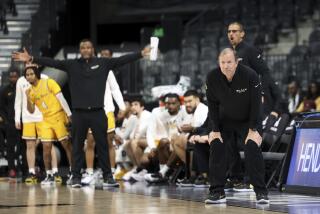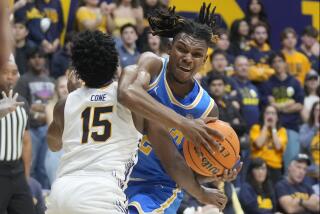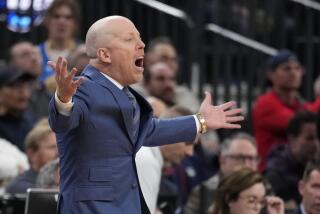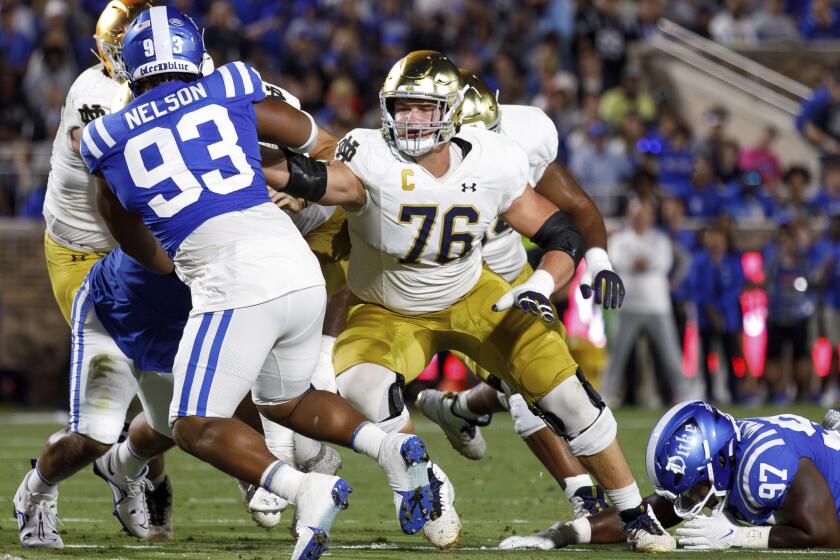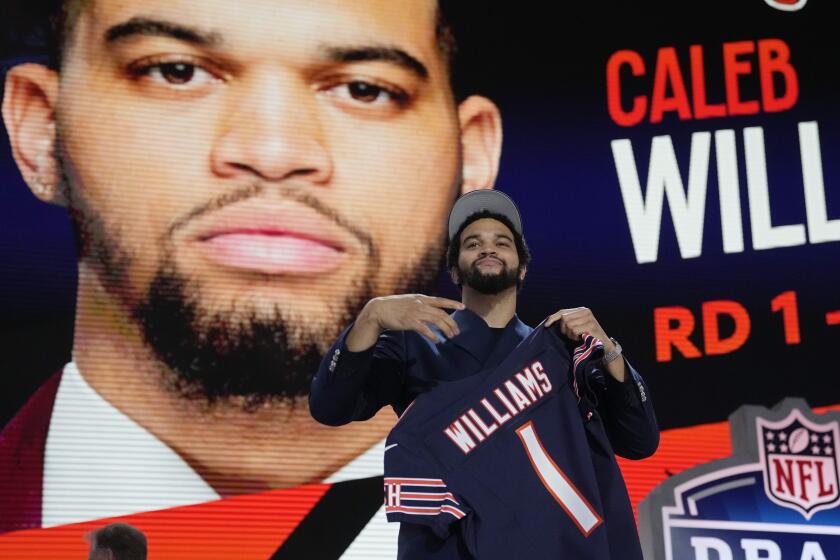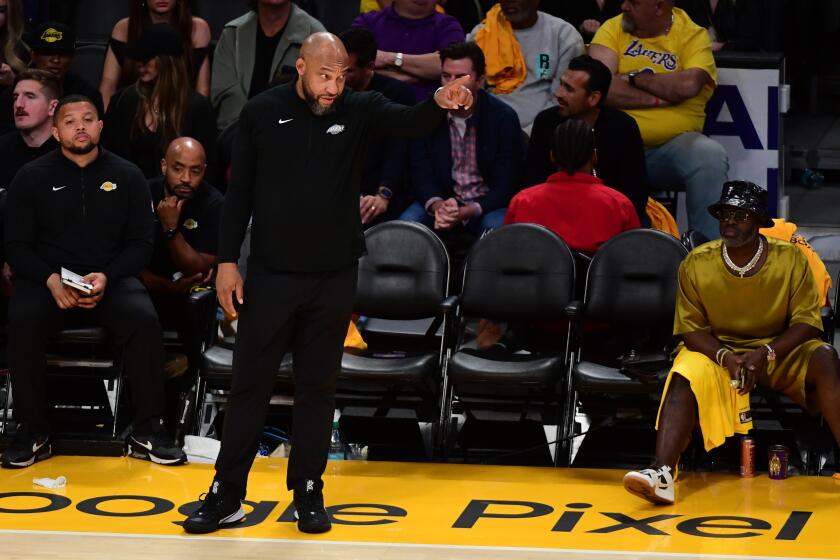Fullerton finds itself on the brink of its 27th consecutive NCAA regional trip
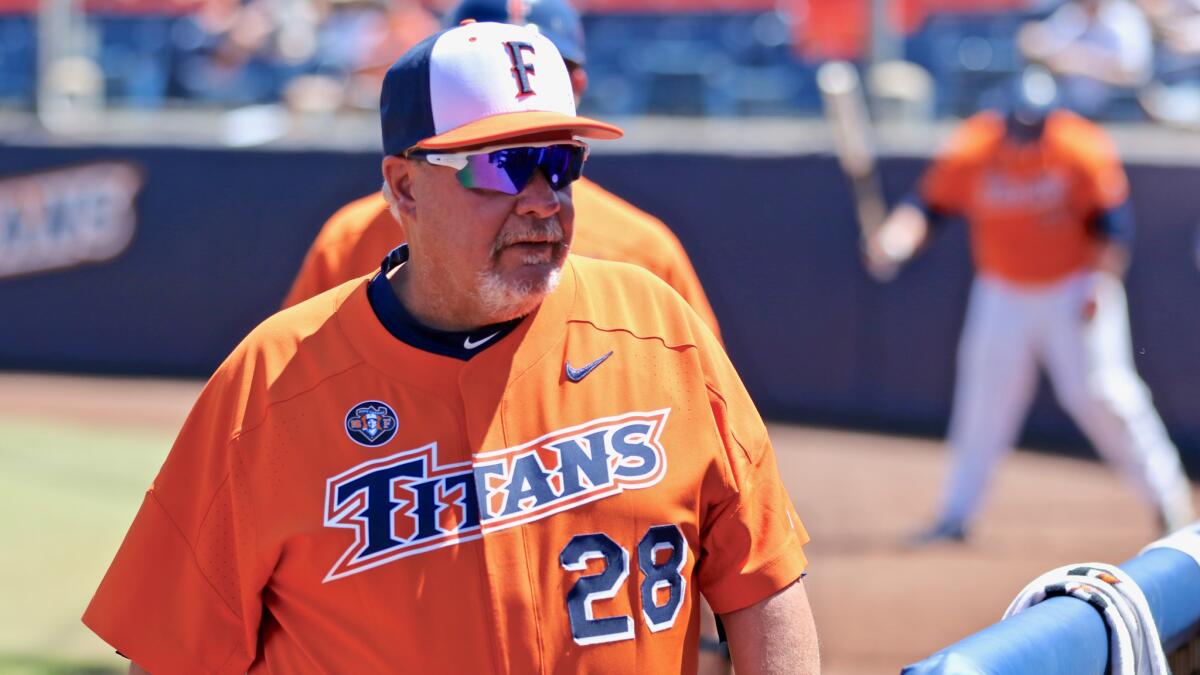
Cal State Fullerton doesn’t care about conference championships or regional titles or the baseball team’s regular-season records. For the Titans, there’s only one annual goal.
“We don’t expect to win a regional or to win the Big West,” former third baseman Tony Martinez explained. “We expect to go to Omaha.”
But the school that measures success in trips to the College World Series started the season 1-7 and was 10-15 on April 1. The four-time national champions had qualified for an NCAA regional in 26 consecutive years, but after the rough beginning it looked like this might be the year the streak would die.
It wasn’t.
Fullerton (32-23) will face Baylor (36-19) Friday at 2 p.m. PDT in its first game of the Stanford Regional, keeping the postseason streak alive along with a string of 44 consecutive years with at least 30 wins.
“They started off rough, but I don’t think anyone in their right mind thought they weren’t coming back,” UCLA coach John Savage said.
Savage and others credit coach Rick Vanderhook for the Titans’ never-quit attitude.
Steve DiTolla, Fullerton’s senior associate athletics director, said that characteristic is constantly displayed by the man who friends and former players affectionately call “Hooky.” And he shared a story to prove it.
It happened in South Korea, where Fullerton was representing the United States in the 2015 World University Games.
It rained often during the tournament, and the hosts didn’t have a tarp to cover the field. If it rained, it was game over.
Fullerton was playing Japan after the field was dried with large sponges. Titans outfielder Josh Vargas lined a ball toward center field and, according to DiTolla, the ball fell “about five feet” in front of the Japanese outfielder, yet Vargas was called out.
Vanderhook emerged from the dugout, waddled toward the umpire, and unloaded. However, it was clear that his protest was lost in the translation. So Vanderhook, not ready to quit, summoned Erik Cha, a pitcher of Korean descent, to interpret his argument.
The move proved ineffective because the umpire was Japanese, but DiTolla found the effort indicative of Vanderhook’s passion.
“If you had a table of ex-players, the stories that would probably come out would be related to his passion. He was very demanding and very drill-sergeant like,” said Oregon coach George Horton, who had Vanderhook on his staff when he coached at Fullerton. “We often kidded him that he should be president of the United States for his unique views on how to discipline people. You certainly couldn’t do what he suggested in some cases.”
Or, as Martinez put it: “He doesn’t know how to frost a cake. He just tells you like it is.”
Like after the Titans bested USC on May 22. Vanderhook was asked if he was happy to see small ball working after his team bunted a runner to second and took third on a delayed steal.
“It didn’t go right,” he said. “We didn’t have a good enough at-bat to get him home.”
Vanderhook’s passion and bluntness are innate on some level. Horton said that even when Vanderhook was a player at Fullerton in the early 1980s, it was already clear he’d make a fine coach. And when he joined the staff in 1985, he learned from the man who eventually became the winningest coach in college baseball history, Augie Garrido.
Vanderhook spent 21 of the next 23 years at Fullerton, learning first from Garrido and then Horton. He experienced the program’s transition to Goodwin Field in 1992, the renovations to the clubhouse and seating in 2000 that allowed the Titans to host regionals, and the years before the upgrades and influx of funding when players changed in the parking lot, practice jerseys faded from navy to gray by season’s end and holes in batting gloves needed to be “big enough” to merit a new pair.
He seemed like a strong candidate to take over when Horton left for Oregon in 2007, but the school opted for Dave Serrano, the UC Irvine coach who worked with Horton and Vanderhook at Fullerton from 1997 to 2004.
Vanderhook, per Horton, was devastated. “That broke his heart,” he said.
When Serrano left for Tennessee in 2012, Vanderhook got another opportunity. He’d spent three seasons with Savage at UCLA, where he helped the Bruins to a runner-up finish at the College World Series in 2010 by coordinating their offense.
He’d learned how to make players tough and how to apply pressure under Garrido, how to call a game from Horton and was always a great recruiter, his former players said, as he was largely responsible for assembling the 1995 championship team.
“He was a proven man,” former Fullerton pitcher Ted Silva said. “For anyone to say he wasn’t next in line would have been foolish.”
Vanderhook has proved himself further in the seven years since by leading Fullerton to Omaha in 2015 and 2017, and to five Big West titles. He’s also proved that his team can turn around tough beginnings.
The Titans started 2017 4-4 and ended in Omaha. They started 2016 12-11 and ended in a regional. They started 2015 2-5 and ended in Omaha. And in 2014, a season in which they opened the season ranked No. 1 nationally by “Collegiate Baseball,” the Titans were 18-14 and had lost three of its first four Big West games when Vanderhook was suspended after an expletive-laden outburst on the team bus after a series loss to UC Santa Barbara was recorded by a player.
He was away from the team for a month, and the Titans went 7-8 in that span. His first game back, Fullerton defeated Big West leader UC Irvine and its ace, Andrew Morales, who was 19-0 over two seasons before the loss. That ignited a seven-game winning streak to close the regular season, the campaign not ending until the Titans fell to Oklahoma State in a regional final at Stillwater, Okla.
So how does Vanderhook do it?
“When everything gets tough, we know how to come back and just keep grinding,” said 5-foot-6 second baseman, Hank LoForte.
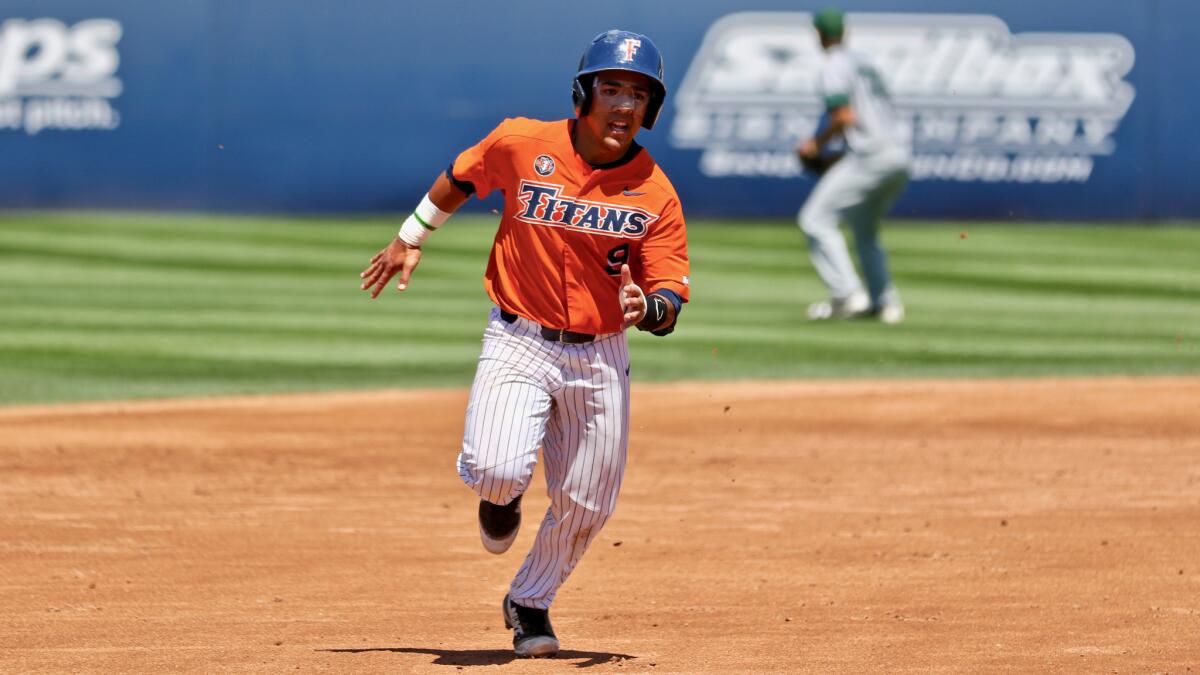
LoForte is an example of the type of undervalued hard-nosed player Vanderhook and Fullerton count on. He was ranked No. 500 in the 2015 recruiting class by Perfect Game USA, despite hitting .414 as a senior en route to a first-team all-state selection. But Vanderhook made him a Titan — a player who may not be the most touted, but who’s going to be tough, smart, disciplined and productive.
LoForte leads the team with a .341 average entering the playoffs.
“There’s always some adversity or some struggle here, but it’s never gonna get in our way,” LoForte added. “That’s the beauty of it.”
Since losing five of eight midway through the season, the team is 13-3. And despite entering the regional round without a particularly strong record and on the road seeded No. 3 out of four teams, opponents know what the Titans are capable of.
Just ask Florida State’s Mike Martin, whose team eliminated Fullerton from the College World Series last season.
“You better play well,” he said, “or you’re gonna get beat.”
More to Read
Get our high school sports newsletter
Prep Rally is devoted to the SoCal high school sports experience, bringing you scores, stories and a behind-the-scenes look at what makes prep sports so popular.
You may occasionally receive promotional content from the Los Angeles Times.
